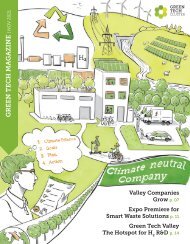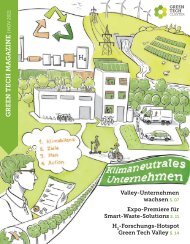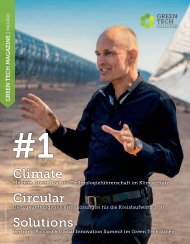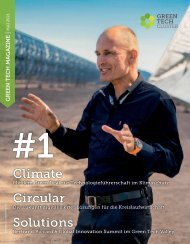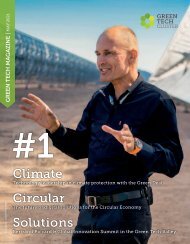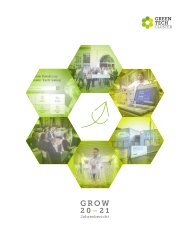Green Tech Magazine May 2019 en
Green Urban Life Urban spaces around the world are trialling advanced technologies and sustainable concepts. These cities of the future are all about a green lifestyle. The Smart City of Graz is taking a new approach to urban development at the interface between energy, mobility and lifestyle with everything from regional energy production and storage, innovative building technologies and rooftop farming. Water is the source of all life and Styrian companies are bubbling over with innovation and expertise on resource conservation, water treatment, irrigation systems, hydropower and the cooling of public spaces. Styria is a hotspot for young green talent, as the creative ideas that emerged from the interdisciplinary student Green Tech Jam hackathon prove. And the JOANNEUM RESEARCH lifestyle check shows what each and every one of us needs to do to have a sustainable lifestyle.
Green Urban Life
Urban spaces around the world are trialling advanced technologies and sustainable concepts. These cities of the future are all about a green lifestyle. The Smart City of Graz is taking a new approach to urban development at the interface between energy, mobility and lifestyle with everything from regional energy production and storage, innovative building technologies and rooftop farming.
Water is the source of all life and Styrian companies are bubbling over with innovation and expertise on resource conservation, water treatment, irrigation systems, hydropower and the cooling of public spaces.
Styria is a hotspot for young green talent, as the creative ideas that emerged from the interdisciplinary student Green Tech Jam hackathon prove. And the JOANNEUM RESEARCH lifestyle check shows what each and every one of us needs to do to have a sustainable lifestyle.
Create successful ePaper yourself
Turn your PDF publications into a flip-book with our unique Google optimized e-Paper software.
6 GREEN TECH MAGAZINE 7
The winning team with Armin Schöpf and Alexander
Malik: their app is intended to make users aware of how to
properly harness green solar energy.
A third of the waste generated
is construction and demolition waste.
Together with seven European regions,
Styria is developing strategies
for improving the recycling
of building materials.
Construction waste
in the loop
The federal government of Styria (Das Land Steiermark) is actively working to
introduce construction waste into the closed-loop recycling process.
In the EU a huge amount of waste comes
from the construction sector: A third of
the waste generated is construction and
demolition waste, and that's not including
excavated soil material. These figures are
the reason why Department 14 of the Styrian
government (Department of Waste Management
and Sustainability) has been an
active partner in the EU CONDEREFF project
(Construction & demolition waste management
policies for improved resource efficiency)
since 2018. This international cooperation
aims to improve strategies for a
resource-efficient economy. This goal will
be achieved through cooperation among
the regions as well as a regular exchange
of experience and knowledge among the
eight European partners.
Furthermore, the large amounts of waste
are the reason why the EU is committing
more strongly to the “Construction and
Demolition Waste Management Protocol”.
This protocol is intended to promote Europe’s
transition to a circular economy as
part of the EU's circular economy pact.
Particular attention will be paid to developing
efficient rules and procedures in order
to adapt the legal framework accordingly.
By anchoring the provisions of the
protocol in regional strategies and directives,
CONDEREFF is setting its sights on
further progress.
Styria, together with seven other European
partners, has committed itself to implementing
the protocol. The agreed objectives are
to be achieved through appropriate waste
management with the help of a thorough
exchange of experience, knowledge transfer
and best practice examples. Until 2023,
mechanisms will be developed in Styria in
close cooperation with the regional stakeholders
with the aim of increasing the circulation
of recycled materials. In addition,
these measures relieve landfill and primary
raw materials resources. To achieve this, actions
and measures will be continually set.
The proportion of impurities rises and the
possibility for recycling falls when construction
and demolition waste are mixed. A key
element in all measures, therefore, is the separate
collection of individual waste types at
construction sites in order to enable the recycling
of each respective waste type.
www.interregeurope.eu/condereff
Photo credits: Shutterstock
App activates electricity consumption
at high noon
Armin Schöpf and Alexander Malik won this year's Green Tech Jam together
with their team. Their mobile app encourages people to turn on electrical devices
when the sun is producing the most electricity.
Photo credits: Green Tech Cluster
Armin Schöpf and Alexander Malik are
spokesmen for the four-man team which
won “Green Tech Jam 2019”. Their idea to
optimise the way individuals use the electricity
from photovoltaic plants (PV) with
a mobile app impressed the public most
at Green Tech Jam 2019. "The challenge
was to get the inhabitants of an apartment
block to use electricity when the PV plant
produces the most electricity – usually between
11 and 2 midday, at high noon so to
speak. This gave us the idea to develop a
mobile app which allows the tenants to
switch on smart washing machines, robot
vacuum cleaners or dishwashers exactly
when the sun produces the most electricity,”
explains Armin Schöpf. After all,
electricity consumption can be reduced by
as much as 30% by adjusting the times at
which electronic devices are used. “It was
also about making app users more aware
of how to properly use green solar energy,”
adds Alexander Malik. Not only do tenants
notice the increase in efficiency because
their electricity bill is lower, but they are
also awarded points for their intelligent
Wolfgang Jilek's Cartoon
„Total Recycling”
use of electricity which they can redeem in
online shops.
Armin Schöpf is 21 years old and comes
from Fulpmes in Stubaital, Tyrol. He is in his
4th semester at TU Graz, where he studies
software development and business management.
"I’m really interested in the subject
of energy saving in the context of my
course too. I’m also involved in business
consulting for students,” Armin Schöpf
elaborates on his interests. After finishing
his studies, Schöpf wants to implement
green innovations, perhaps in the Science
Park. Furthermore, he is already part of a
start-up that specialises in identifying nutrients
in agricultural land.
Alexander Malik, 25, comes from Gütersloh
in Germany. He encountered the problem
of waste while travelling extensively in
Southeast Asia and Australia, and devoted
himself to the topic of recycling. He studies
recycling technology at the University
of Leoben and came second at Green
Tech Jam 2018, so he's even happier to
have clinched first this year. He also works
in a start-up: “Schrott24” digitalises scrap
trading. Malik sees his professional future
in smart cities, as a way to make cities,
businesses and households more sustainable
through green technologies & concepts.




